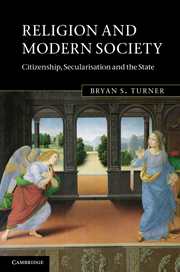Book contents
- Frontmatter
- Contents
- Acknowledgements
- Introduction: the state of the sociology of religion
- Part I Theoretical frameworks: the problem of religion in sociology
- 1 Religion, religions and the body
- 2 Émile Durkheim and the classification of religion
- 3 Max Weber and comparative religion
- 4 Talcott Parsons and the expressive revolution
- 5 Mary Douglas and Modern Primitives
- 6 Pierre Bourdieu and religious practice
- Part II Religion, state and post-secularity
- References
- Index
5 - Mary Douglas and Modern Primitives
Published online by Cambridge University Press: 05 June 2012
- Frontmatter
- Contents
- Acknowledgements
- Introduction: the state of the sociology of religion
- Part I Theoretical frameworks: the problem of religion in sociology
- 1 Religion, religions and the body
- 2 Émile Durkheim and the classification of religion
- 3 Max Weber and comparative religion
- 4 Talcott Parsons and the expressive revolution
- 5 Mary Douglas and Modern Primitives
- 6 Pierre Bourdieu and religious practice
- Part II Religion, state and post-secularity
- References
- Index
Summary
Introduction
The work of Mary Douglas provides a framework for thinking about modern culture, the changing nature of social solidarity, the decline in the social functions of religious rituals and the quest for personal authenticity through corporeal regulation. Douglas can be relatively easily interpreted as a modern exponent of Émile Durkheim's sociology, especially of his sociology of knowledge and religion. Durkheim's core sociological ideas are well known, and hence I shall merely sketch some of the salient issues in this ‘Introduction'. In The Elementary Forms of Religious Life ([1912] 2001), Durkheim argued that the separate components of a culture can only be understood within a system, and thus the idea of the profane only makes sense in the context of its opposite, namely the sacred. We can therefore study religion as a classificatory system that divides the world into people, objects or spaces that are either sacred or profane. From a sociological perspective, this system is important because such religious rituals have the function of creating cohesive social groups and rituals that give rise to collective emotions which in turn reinforce group cohesion. In terms of Durkheim's typology of societies, we have evolved from a social world in which the individual was submerged in the social group (mechanical solidarity) to a society based on separate individuals held together by such institutions as the law, the division of labour and nationalist ideologies (organic solidarity); and finally we are in a transitional stage between the old and the new – the old gods are dead and new ones have yet to arrive.
- Type
- Chapter
- Information
- Religion and Modern SocietyCitizenship, Secularisation and the State, pp. 84 - 101Publisher: Cambridge University PressPrint publication year: 2011



